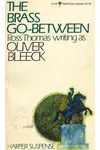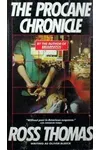Step into the suave, shadowy world of Philip St. Ives, where high-stakes negotiations and a sharp wit make every page a thrill! Ross Thomas’s Philip St. Ives series, written under the pseudonym Oliver Bleeck, is a gem of 1970s crime fiction. This globe-trotting professional go-between navigates the murky line between criminals and clients, delivering a unique blend of intrigue, humor, and moral complexity that keeps readers hooked.
Unlike the gritty private eyes of classic noir, St. Ives is a polished mediator who trades seedy offices for swanky hotels and international locales. With only five novels, this concise series punches above its weight, earning a cult following for its clever plots and Thomas’s razor-sharp dialogue. Ready to meet one of crime fiction’s most unforgettable protagonists? Let’s dive in!
How Philip St. Ives Began
Ross Thomas, a former journalist and political strategist, launched the Philip St. Ives series in 1969 with The Brass Go-Between. Writing as Oliver Bleeck, Thomas drew on his worldly experiences—spanning World War II service in the Philippines to political work in Nigeria—to craft a hero who thrives in complex, high-pressure deals. Inspired by the likes of Dashiell Hammett but craving a fresh spin, Thomas envisioned St. Ives as a sophisticated fixer, not a traditional detective, whose cases hinge on negotiation rather than fists.
The series emerged during a golden age of crime fiction, blending hardboiled roots with a jet-setting vibe. Thomas’s knack for cynical humor and political insight gave St. Ives a distinctive edge, setting the stage for a character who’s as much a strategist as he is a sleuth.
The Heart of Philip St. Ives
The series spans five novels, each a masterclass in tight plotting and witty banter. The Brass Go-Between (1969) introduces St. Ives as he’s hired to recover a stolen African shield, only to face double-crosses and dead bodies. In Protocol for a Kidnapping (1971), he tackles the rescue of a kidnapped U.S. ambassador in Yugoslavia, navigating Cold War tensions with sardonic flair. The Procane Chronicle (1971), adapted into the 1976 film St. Ives starring Charles Bronson, sees him entangled with a thief’s stolen diaries, while No Questions Asked (1976) closes the series with a rare book theft that spirals into chaos.
Themes of moral ambiguity, trust, and betrayal run deep. St. Ives operates in a world where everyone—cops, crooks, or clients—has an angle, yet he clings to a personal code, often at great cost. Thomas’s settings, from Washington, D.C., to London and Sarajevo, pulse with 1970s grit and glamour, while his dialogue crackles with dry humor. Fans of Elmore Leonard or Lawrence Block will feel right at home in this stylish, understated universe.
The series’ strength lies in its lean storytelling—most novels clock in under 200 pages—making every twist land with precision. St. Ives himself, a former reporter turned mediator, is both relatable and enigmatic, balancing alimony payments with high-stakes jobs that test his wits and ethics.
Why Philip St. Ives Resonates
Though not as widely known as Raymond Chandler’s Philip Marlowe, St. Ives carved a niche in crime fiction with his unique profession and Thomas’s incisive take on human nature. The series’ blend of caper-style plots and political undertones feels timeless, reflecting the cynicism of its era while speaking to modern distrust in institutions. Its cult status endures among crime fiction aficionados, who prize its wit and economy of style.
The 1976 film adaptation, despite taking liberties, introduced St. Ives to a broader audience, cementing his pop culture footprint. Thomas’s Edgar Awards for other works and his 2002 Gumshoe Lifetime Achievement Award underscore his influence, with St. Ives as a standout creation. For readers craving smart, character-driven thrillers, the series remains a hidden treasure.
- Publication Years: 1969–1976
- Number of Books: 5
- Notable Adaptation: St. Ives (1976 film)
- Author’s Pseudonym: Oliver Bleeck
Grab The Brass Go-Between and dive into Philip St. Ives’s world of slick deals and sharp twists—your next favorite crime series awaits!




